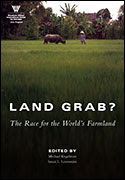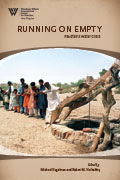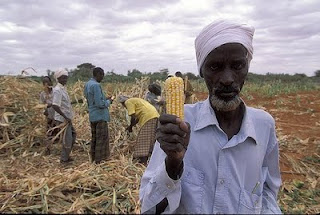-
Land Grab: Sacrificing the Environment for Food Security
›January 27, 2010 // By Wilson Center Staff According to the United Nations, 74 million acres of farmland in the developing world were acquired by foreign governments and investors over the first half of 2009 – an amount equal to half of Europe’s farmland.
According to the United Nations, 74 million acres of farmland in the developing world were acquired by foreign governments and investors over the first half of 2009 – an amount equal to half of Europe’s farmland. -
Trees: The Natural Answer to Climate Change, Food Insecurity, and Global Poverty
›September 30, 2009 // By Brian Klein Some advocates of geoengineering have touted fake, plastic “trees” as a promising technology for absorbing carbon. But other experts are promoting a solution that also filters water, encourages rainfall, prevents erosion and desertification, offers economic opportunities, and provides a vital source of food for a growing global population: real trees.
Some advocates of geoengineering have touted fake, plastic “trees” as a promising technology for absorbing carbon. But other experts are promoting a solution that also filters water, encourages rainfall, prevents erosion and desertification, offers economic opportunities, and provides a vital source of food for a growing global population: real trees. -
Running on Empty: Pakistan’s Water Crisis
› “Water shortages,” warns South Asia scholar Anatol Lieven, “present the greatest future threat to the viability of Pakistan as a state and a society.
“Water shortages,” warns South Asia scholar Anatol Lieven, “present the greatest future threat to the viability of Pakistan as a state and a society.
This warning may be overstated, but Pakistan’s water situation is deeply troubling, as described in a new report from the Woodrow Wilson Center’s Asia Program, Running on Empty: Pakistan’s Water Crisis.
Water availability has plummeted from about 5,000 m3 per capita in the early 1950s to less than 1,500 m3 per capita today. As Simi Kamal reports in the first chapter of Running on Empty, Pakistan is expected to become “water-scarce” (below 1,000 m3 per capita) by 2035—though some experts project this could happen in 2020, if not earlier.
In an unstable nation like Pakistan, water shortages can easily become security threats. In April 2009, alarm bells sounded when the Taliban pushed southeast of Swat into the Buner district of the Northwest Frontier Province. Not only is Buner close to Islamabad, it lies just 60 kilometers from the prized Tarbela Dam, which provides Pakistan with billions of cubic meters of precious water for irrigation each year.
Soaked, Salty, Dirty, and Dry
According to Kamal, Pakistan faces significant and widespread water challenges:- Inefficient irrigation.
- Abysmal urban sanitation.
- Catastrophic environmental degradation.
- Lack of water laws to define water rights.
- Lack of a sound policy on large dams.
Women and Water in Rural Pakistan
Rural women and small farmers are particularly affected by Pakistan’s water crisis. Women bear the primary responsibility for obtaining water, but have been traditionally been shut out of government water-planning and decision-making processes. However, government and media initiatives, described by Sarah Halvorson in Running on Empty’s chapter on water and gender, are increasingly highlighting the importance of women’s participation.
Meanwhile, Adrien Couton reports that Islamabad’s water projects mainly benefit large and wealthy farmers—even though Pakistan has approximately four million farms smaller than two hectares.
Pakistan’s Thirsty Cities
With most of Pakistan’s water dedicated to agriculture, less than 10 percent is left for drinking water and sanitation. A quarter of Pakistanis lack access to safe drinking water—and many of them reside in the country’s teeming cities.
Worse, the drinking water that does exist is quickly disappearing. Lahore, which relies on groundwater, faces water table declines of up to 65 feet, as described by Anita Chaudhry and Rabia M. Chaudhry in their chapter on the city.
The scarcity of clean water in the cities—exacerbated by a lack of wastewater treatment—is a leading cause of deadly epidemics. At least 30,000 Karachiites (of whom 20,000 are children) perish each year from unsafe water.
Pakistan Must Act Now To Solve the Water Crisis
Pakistan arguably has the technological and financial resources to provide clean water. So what’s the hold-up? In her chapter on public health, Samia Altaf argues that the problem is the absence of a strong political lobby to advocate for water—and that no one holds Islamabad accountable for fixing the problem.
The report offers more recommendations for addressing Pakistan’s water:- Invest in existing infrastructure and in modest, indigenous technology.
- Strike appropriate balances between centralized and decentralized management.
- Devote more attention to water allocation and distribution on local/individual levels.
- Understand the links between agricultural and urban water pressures.
- Embrace the role of the private sector.
- Conserve by favoring water-saving technology; less water-intensive crops; and water-conserving urban building design.
- Address structural obstacles like systemic inequality and gender discrimination.
- Take immediate action. Tremendous population growth and rapidly melting glaciers in the Himalayas ensure that the crisis will deepen before it eases.
Michael Kugelman is the Wilson Center’s South Asia specialist. He is co-editor, with Robert M. Hathaway, of the recently published Wilson Center book Running on Empty: Pakistan’s Water Crisis, on which this post is based. Much of his work has focused on resource shortages in Pakistan and India. -
Weekly Reading
›In an Economist.com debate on population growth between John Seager of Population Connection and Michael Lind of the New America Foundation, Seager argues that rapid population growth is “the source of many of the world’s—especially the poor world’s—woes,” as it accelerates environmental degradation and “undermines both security and development.” On the other hand, Lind counters that “countries are not poor because they have too many people,” and asserts that “technology and increased efficiency have refuted what looks like imminent resource exhaustion.”
In Foreign Policy, David J. Rothkopf contends that actions to mitigate climate change—though necessary to avoid very serious consequences—could subsequently spur trade wars, destabilize petro-states, and exacerbate conflict over water and newly important mineral resources (including lithium).
The International Crisis Group (ICG) reports that “the exploitation of oil has contributed greatly to the deterioration of governance in Chad and to a succession of rebellions and political crises” since construction of the World Bank-financed Chad-Cameroon pipeline was completed in 2003. Chad must reform its management of oil resources in order to avoid further impoverishment and destabilization, ICG advises.
The Royal Society and the Institution of Mechanical Engineers (IME)—both based in the United Kingdom—released independent reports on geoengineering the climate. While calling reduction of greenhouse gas emissions “the safest and most predictable method of moderating climate change,” the Royal Society recommends that governments and international experts look into three techniques with the most potential: CO2 capture from ambient air, enhanced weathering, and land use and afforestation. The IME identified artificial trees, algae-coated buildings, and reflective buildings as the most promising alternatives. “Geo-engineering is no silver bullet, it just buys us time,” IME’s Tim Fox told the Guardian.
In “Securing America’s Future: Enhancing Our National Security by Reducing Oil Dependence and Environmental Damage,” the Center for American Progress (CAP) argues that unless the United States switches to other fuels, it “will become more invested in the volatile Middle East, more dependent on corrupt and unsavory regimes, and more involved with politically unstable countries. In fact, it may be forced to choose between maintaining an effective foreign policy or a consistent energy supply.”
The Chinese government is “drawing up plans to prohibit or restrict exports of rare earth metals that are produced only in China and play a vital role in cutting edge technology, from hybrid cars and catalytic converters, to superconductors, and precision-guided weapons,” The Telegraph relates. The move could send other countries scrambling to find replacement sources.
In studying the vulnerability of South Africa’s agricultural sector to climate change, the International Food Policy Research Institute finds that “the regions most vulnerable to climate change and variability also have a higher capacity to adapt to climate change…[and that] vulnerability to climate change and variability is intrinsically linked with social and economic development.” South African policymakers must “integrate adaptation measures into sustainable development strategies,” the group explains. -
Weekly Reading
›Christian Aid’s “Growing Pains: The Possibilities and Problems of Biofuels” finds that “huge subsidies and targets in developed countries for boosting the production of fuels from plants such as maize and palm oil are exacerbating environmental and social problems in poor nations.”
Framing the climate change debate in terms of national security could help advance climate legislation in Congress, argues a New York Times editorial, one week after its front-page article on the topic. In letters to the editor, James Morin of Operation FREE calls climate change the “ultimate destabilizer,” and retired Vice Admiral Lee Gunn warned that the “repercussions of these changes are not as far off as one would think.”
Researchers at Purdue University’s Climate Change Research Center found that climate change could deepen poverty, especially in urban areas of developing countries, by increasing food prices. “While those who work in agriculture would have some benefit from higher grains prices, the urban poor would only get the negative effects.” Of the 16 countries studied, “Bangladesh, Mexico and Zambia showed the greatest percentage of the population entering poverty in the wake of extreme drought.”
India’s 2009 State of the Environment Report finds that almost half of the country’s land is environmentally degraded, air pollution is increasing, and biodiversity is decreasing. In addition, the report points out that almost 700 million rural people—more than half the country’s population—are directly dependent on climate-sensitive resources for their subsistence and livelihoods. And furthermore, “the adaptive capacity of dry land farmers, forest dwellers, fisher folk and nomadic shepherds is very low.”
Surveys completed by a Cambodian national indigenous peoples network find that “five million hectares of land belonging to indigenous minority peoples [have] been appropriated for mining and agricultural land concessions in the past five years,” reports the Phnom Penh Post.
The Economic Report on Africa 2009 warns that despite declining food prices, “many African countries continue to suffer from food shortage and food insecurity due to drought, conflicts and rigid supply conditions among other factors.” -
Focus on Food Security as Clinton Lands in Africa
›August 7, 2009 // By Brian Klein In what CNN has dubbed her “biggest trip yet,” Secretary of State Hillary Clinton has commenced an 11-day, seven-nation tour of Africa that will take her to many of the continent’s most volatile states, including Kenya, South Africa, Angola, the Democratic Republic of Congo (DRC), Nigeria, Liberia, and Cape Verde.
In what CNN has dubbed her “biggest trip yet,” Secretary of State Hillary Clinton has commenced an 11-day, seven-nation tour of Africa that will take her to many of the continent’s most volatile states, including Kenya, South Africa, Angola, the Democratic Republic of Congo (DRC), Nigeria, Liberia, and Cape Verde.
Global hunger and food security are her top agenda items, as Clinton and African leaders discuss how the United States can help improve the continent’s agricultural sector. Also on the table will be the “Second Scramble for Africa“— the recent spate of developed nations buying up African agricultural land (map) to assure their access to adequate food supplies, which was the subject of a recent Wilson Center conference (video).
More Mouths to Feed
According to the Food and Agriculture Organization (FAO), one billion people are undernourished. If current population projections are correct, that figure is likely to grow. “In the coming 20 years alone, worldwide demand for food is expected to rise by 50 percent,” note Horand Knaup and Juliane von Mittelstaedt in Der Speigel.
Climate change will compound the already-daunting challenge of increasing food production by further “reducing harvests in much of the world, raising the specter of what some scientists are now calling a perpetual food crisis,” Joel K. Bourne, Jr. explains in National Geographic‘s special report, “The End of Plenty.”
Africa: Ground Zero
Sub-Saharan Africa—with birthrates averaging 5.4 children per woman and a farming sector dominated by small producers whose average yield per hectare has remained constant over the last 40 years—is particularly vulnerable to such a crisis. Both Secretary Clinton and President Obama have pushed for increased investment in the continent’s agricultural sector.
“There is no reason why Africa cannot be self-sufficient when it comes to food,” said Obama at the conclusion of this month’s G8 summit in L’Aquila, Italy. “It has sufficient arable land. What’s lacking is the right seeds, the right irrigation, but also the kinds of institutional mechanisms that ensure that a farmer is going to be able to grow crops, get them to market, get a fair price.”
Launching his book on African food security, Enough! Why the World’s Poorest Starve in an Age of Plenty, coauthor Roger Thurow told a Wilson Center audience, “We hope to provide both an instructional and inspirational tale to show that hunger today is largely man-made, that so much is also caused by policies and decisions that span the political spectrum, and to inspire by showing hunger is truly achievable to conquer.”
Pledges of Aid, but Land Grab Continues
Largely thanks to Obama’s prodding, G8 countries agreed to invest $20 billion for farm aid in developing countries over the next three years. However, the leaders were unable to agree on a set of shared principles regarding foreign acquisition of arable land.
A number of relatively wealthy but land- and water-strapped nations, including Saudi Arabia, China, South Korea, and the United Arab Emirates, as well as many corporations and other investors, have purchased millions of hectares of land in other developing countries. Asia and South America have been targeted by some, but the inexpensive, fertile land of impoverished Africa appears to be the primary prize.
While some might praise the transfer of land to those with the capital and technology to make it productive, questions abound when one considers the dual pressures of population growth and a changing climate. “[W]hat happens with famine strikes these countries? Will the wealthy foreigners install electric fences around their fields, and will armed guards escort crop shipments out of the country?” ask Knaup and von Mittelstaedt.
The Ethics of Land-Grabbing
In completing such transactions, governments often ignore customary land tenure, selling tracts that are already inhabited and cultivated by small-scale subsistence farmers whose families have lived on the land for generations, but who have no formal deed of ownership.
To prevent such exploitation, experts have suggested the adoption of international rules to govern foreign acquisition of agricultural land in the developing world. A report from the International Food Policy Research Institute recommends a broad swath of measures to ensure transparency, respect for existing land rights, benefit-sharing, environmental sustainability, and adherence to national trade policies.
The Devil Is in the Details
Adding to the strong statements by the G-8 and Secretary Clinton, the FAO plans to convene an international food security summit in Rome this November, which will call for the eradication of hunger by 2025. While these are welcome developments, the details remain unclear.- Will a repeat of the “Green Revolution” save African farmers?
- Is it responsible to engender dependence on petroleum-based fertilizers, if it increases production in the short-term?
- What are the implications of selling arable land to foreign investors?
- How will large-scale commercialization and mechanization of farming transform developing societies?
- What about genetically-modified seeds?
- Can we eradicate hunger in the next 15 years?
Photo: Men gather corn at a farm in Kenya. Courtesy Curt Carnemark and Flickr user World Bank (pool). -
Climate Change Threatens Water Supplies in Australia, California
›July 1, 2009 // By Brian Klein Climate change “could be the straw that breaks the camel’s back” for California’s precarious water system, said W. Michael Hanemann of the University of California, Berkeley, at an event hosted by the Wilson Center’s Environmental Change and Security Program on June 15, 2009. He was joined by Jon Barnett of the University of Melbourne, who discussed some of Australia’s policy responses to its increasingly dry, variable climate.
Climate change “could be the straw that breaks the camel’s back” for California’s precarious water system, said W. Michael Hanemann of the University of California, Berkeley, at an event hosted by the Wilson Center’s Environmental Change and Security Program on June 15, 2009. He was joined by Jon Barnett of the University of Melbourne, who discussed some of Australia’s policy responses to its increasingly dry, variable climate. -
Climate Change Not the Only Environmental Problem, Says U.K. Environment Secretary
›May 22, 2009 // By Rachel Weisshaar The Copenhagen climate conference will be “the most important gathering in human history,” said the United Kingdom’s environment secretary, Hilary Benn, at the Wilson Center on May 14, 2009 (full text of speech). While “an agreement on cutting emissions would be the biggest single step we could take to safeguard [natural] resources,” said Benn, “even such an agreement will not—indeed cannot—encompass all of the things we need to do to safeguard our environment.”
The Copenhagen climate conference will be “the most important gathering in human history,” said the United Kingdom’s environment secretary, Hilary Benn, at the Wilson Center on May 14, 2009 (full text of speech). While “an agreement on cutting emissions would be the biggest single step we could take to safeguard [natural] resources,” said Benn, “even such an agreement will not—indeed cannot—encompass all of the things we need to do to safeguard our environment.”
“The most glaring threat is that of dangerous climate change. But it is not the only example of the problems we create when we exploit the world’s resources unsustainably,” explained Benn.
“The spiraling price of food in 2008 was a wake-up call. Riots threatened political stability. Export bans threatened world trade. Wheat prices doubled, rice quadrupled. And another 75 million people were threatened by poverty and hunger,” Benn said.
Although food prices have fallen recently, continuing growth in the global population—expected to reach at least 9 billion by 2050—and rising standards of living in poor and middle-income countries mean that world food production will need to double by 2050. This demand for food—especially more meat and dairy products—will put increasing pressure on land and water. Conflicts could erupt over these scarce resources if they are not managed properly, Benn warned.
Already, wealthy governments and corporations are buying farmland in Africa and other parts of the developing world—leading to unrest. Widespread anger at South Korean company Daewoo’s proposal to purchase more than half of Madagascar’s arable land contributed to the ouster of former Malagasy President Marc Ravalomanana.
Benn highlighted an apparent Catch-22: “Development is the best way of lowering the rate of population growth and so, in turn, lowering the pressure on resources. But development also increases income, and therefore demand.”
The way to free ourselves from this cycle, Benn said, is to create an environmentally sustainable economy, so that economic development does not degrade the environment. He proposed:- Starting to build tomorrow’s sustainable economy even as we work to contain today’s economic crisis;
- Changing the incentives in our economies—through regulation and financial inducements—to promote environmentally sustainable choices;
- Creating the jobs that will power this new sustainable economy; and
- Working together as an international community to address water scarcity, food security, and biodiversity loss.
Benn called for U.S. leadership on climate change and other environmental issues: “We need America to apply all of its great energy to the task we, together, face.”
Photo: Hilary Benn. Courtesy of Dave Hawxhurst and the Wilson Center.
Showing posts from category agriculture.


 According to the United Nations, 74 million acres of farmland in the developing world were acquired by foreign governments and investors over the first half of 2009 – an amount equal to half of Europe’s farmland.
According to the United Nations, 74 million acres of farmland in the developing world were acquired by foreign governments and investors over the first half of 2009 – an amount equal to half of Europe’s farmland. Some advocates of
Some advocates of  “Water shortages,” warns South Asia scholar Anatol Lieven, “present
“Water shortages,” warns South Asia scholar Anatol Lieven, “present 
 Climate change “could be the straw that breaks the camel’s back” for California’s precarious water system, said W. Michael Hanemann of the University of California, Berkeley,
Climate change “could be the straw that breaks the camel’s back” for California’s precarious water system, said W. Michael Hanemann of the University of California, Berkeley,  The Copenhagen climate conference will be “the most important gathering in human history,” said the United Kingdom’s environment secretary, Hilary Benn, at the Wilson Center on May 14, 2009 (
The Copenhagen climate conference will be “the most important gathering in human history,” said the United Kingdom’s environment secretary, Hilary Benn, at the Wilson Center on May 14, 2009 (

